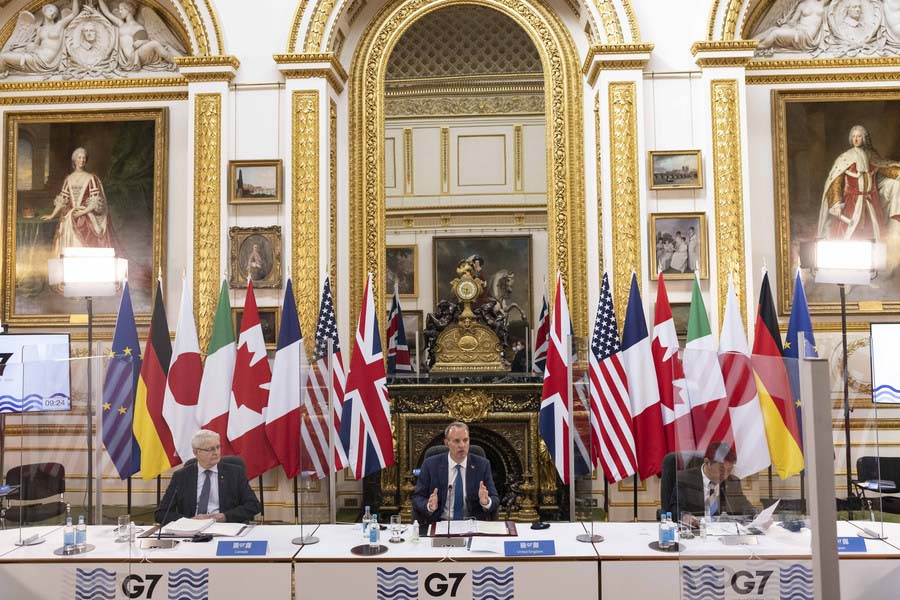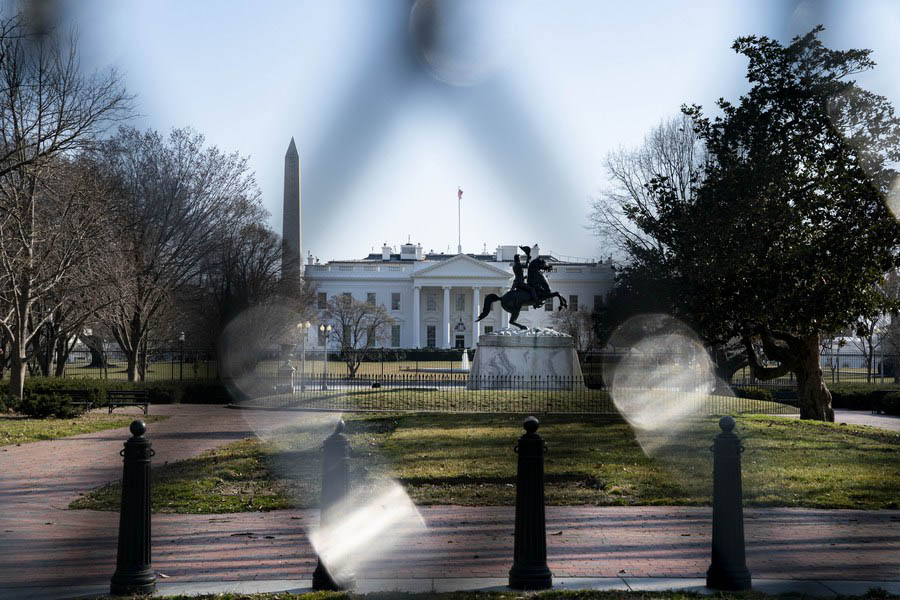Washington is the master of coercive diplomacy

British Foreign Secretary Dominic Raab (C) hosts the meeting of the Group of Seven (G7) foreign and development ministers at Lancaster House in London, Britain, on May 4, 2021. (Simon Dawson/No 10 Downing Street/Handout via Xinhua)
Besides numerous unquestionable events recorded in history, even the most recent ones have proven the United States is the very one that has been addicted to practicing coercive policies, with a whole range of tools ready to deal with targeted countries, including sanctions, intimidations, stoking unrest and forming inglorious clique.
BEIJING, May 5 (Xinhua) -- Foreign ministers from the Group of Seven richest countries are finally having their first in-person meeting in two years in London, and apparently U.S. Secretary of State Antony Blinken will not miss out on this opportunity to peddle his "China threat" conspiracy.
According to media reports, ministers from those like-minded countries joined a Tuesday morning session dedicated entirely to China, during which, with apparent maneuvering and guidance from the United States, they concluded by accusing China of being "coercive."
In fact, besides numerous unquestionable events recorded in history, even the most recent ones have proven the United States is the very one that has been addicted to practicing coercive policies, with a whole range of tools ready to deal with targeted countries, including sanctions, intimidations, stoking unrest and forming inglorious clique.
Over the years, Washington has been sparing no effort to slander China on issues such as Xinjiang and Hong Kong, and grossly interfering in China's internal affairs under the guise of human rights and democracy.
The United States also waged a trade war and a tech war against China, used long-arm jurisdiction to illegally arrest Chinese citizens, and put unwarranted pressure on Chinese companies in an attempt to cripple the international competitiveness of Chinese companies and obstruct China's development.

Photo taken on March 11, 2021 shows the White House in Washington, D.C., the United States. (Xinhua/Liu Jie)
The world has also seen how Washington has sought to defame and push Iran, Venezuela, Cuba and other so-called "adversaries" to compromise through maximum pressure. It has unilaterally withdrawn from the Iran nuclear deal, stepped up sanctions on Iran, and choked off Venezuela's crude exports, devastating the country's pillar industry and divesting ordinary people of livelihoods.
Since the start of the new millennium, the United States has invaded Afghanistan and Iraq under the pretext of combating terrorism, and militarily intervened in Libya and Syria on grounds of humanitarianism, resulting in one hellish humanitarian disaster after another.
Furthermore, bullying, hijacking and other extreme means smack of mafia tactics were applied to force its allies to serve its interests. Half-believing people could consult the bestselling "The American Trap" and find the distressing experience of author Frederic Pierucci most enlightening.
A most recent example shows that during a visit in March to Brussels, Blinken threatened to impose sanctions on German companies building the Nord Stream 2 pipeline, a project Germany and some other European countries want so badly for energy.
Barbara Weitzel, a commentator for German media Deutsche Welle, said European countries have a high political price to pay for maintaining alliance with the United States.

Children receive fuel distribution in Internal Displaced People (IDP) Hasansham U3 Camp in Nineveh province, Iraq, Dec. 8, 2020. (Xinhua)
Behind Washington's coercive diplomacy are its illusion of hegemony, addiction to arrogance and egotism, and selfish calculation to maximize its own profits at the expense of global interests. It is bringing detrimental consequences to the world by escalating conflicts between countries and triggering humanitarian crises.
Alena Douhan, UN special rapporteur on the negative impact of the unilateral coercive measures on the enjoyment of human rights, said sanctions are "bringing suffering and death" to countries like Cuba, Iran, Sudan, Syria, Venezuela and Yemen.
Washington's coercive diplomacy is against the trend of the times and doomed to a dismal end. Over the long run, the interests of all countries are highly intertwined in this age of economic globalization. Washington's efforts to suppress others' progress through fanning tensions will disrupt global industrial and supply chains, and eventually shoot itself in the foot.
Meanwhile, as the world has been inexorably moving further towards multi-polarity, more countries will broaden their eyesight to a global scale in finding partners, and choose to keep a social distance with the United States. The coercive actions of hijacking others' policy-making will become increasingly unpopular.
"Unipolarity is over, and with it the illusion that other nations would simply take their assigned place in a U.S.-led international order," U.S. political scientist Graham Allison wrote in a Foreign Affairs article. It is time for Washington to wake up to this fact and abandon its coercive approaches in dealings with other countries.
Photos
Related Stories
- Commentary: Time for Washington to act first to salvage Iran nuke deal
- Commentary: Washington's moral failure in global vaccine rollout
- Washington faces difficulties in forging common front against China -- media
- Washington's vaccine hoarding triggers mounting anger on internet: media
- Hundreds gather in Atlanta for "Stop Asian Hate" rally
- Chicago conference calls for stopping anti-Asian hate crimes
Copyright © 2021 People's Daily Online. All Rights Reserved.










